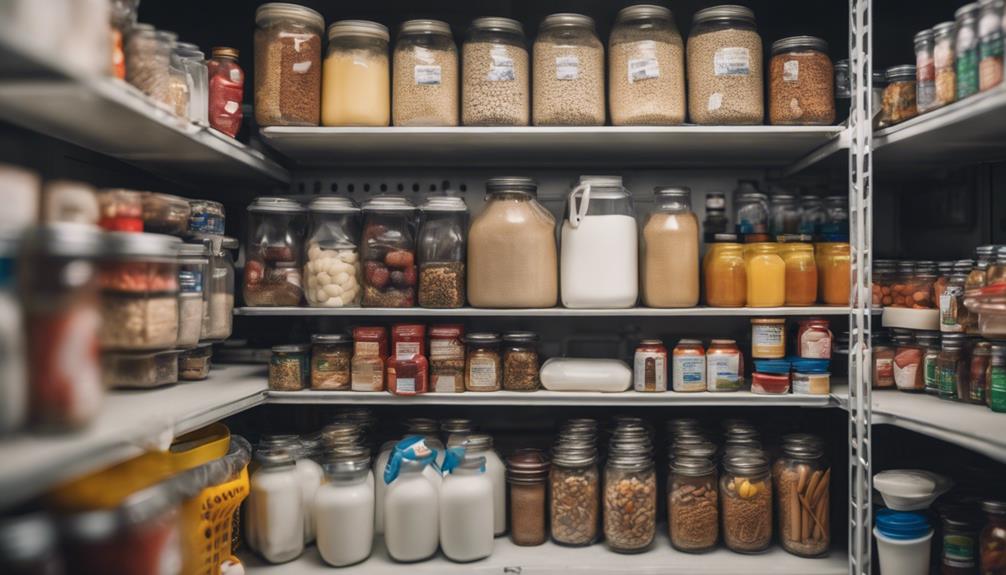Stay proactive as a prepper to combat supply chain woes. Prepare for shortages by stocking up on essential resources in advance. Be ready for delays and price hikes by diversifying your sources. Stay informed about global developments to adapt swiftly. Prioritize crucial items and consider bulk purchasing for savings. Flexibility is key in managing fluctuating availability. Keep yourself well-prepared for emergencies.
Key Takeaways
- Diversify supply sources to mitigate shortages.
- Monitor global trade disruptions for proactive planning.
- Stay informed on geopolitical conflicts affecting supply chains.
- Adapt stockpiling strategies based on ongoing challenges.
- Prioritize essential items to prepare for scarcity.
Understanding Supply Chain Disruptions
Understanding the disruptions in the supply chain is vital for preppers facing shortages of essential supplies. The current global shipping crisis has led to logistics disruptions, causing delays, shortages, and price increases in obtaining necessary items. Geopolitical tensions, labor shortages, and disease outbreaks further exacerbate these challenges, making it essential for preppers to grasp the root causes of these supply chain disruptions.
In the midst of this crisis, staying informed about the global shipping crisis is key to anticipating and mitigating potential supply chain issues. By monitoring the evolving situation, preppers can adapt their strategies to secure essential supplies effectively.
Being proactive and understanding how logistics disruptions impact the availability of crucial items will enable preppers to navigate through shortages more efficiently. Stay vigilant and informed to stay ahead of the supply chain issues plaguing the availability of essential supplies.
Impact of Geopolitical Conflicts

You should be aware that geopolitical conflicts are causing disruptions in global trade, leading to potential risks of resource scarcity.
With conflicts like the Yemeni rebels impacting shipping routes, essential supplies for preppers might face delays and shortages.
Stay vigilant about these conflicts as they could have a substantial impact on the availability and cost of important prepping resources.
Global Trade Disruptions
Geopolitical conflicts are markedly disrupting global trade routes, impacting the flow of goods and causing delays in shipments worldwide. Instances such as Malaysia's ban on Israel-affiliated vessels and Yemeni rebels targeting cargo ships in the Red Sea are leading to rerouting and significant delays of 2 to 3 weeks. These disruptions are particularly affecting the transportation of essential items like medical supplies, prompting the need to find alternative routes to guarantee these critical goods reach their destinations on time.
The political tensions impacting crucial maritime routes like the Suez Canal and the Strait of Malacca are creating uncertainty in delivery times and potentially causing scarcity of goods. Decisions made in distant boardrooms are now shaping the reality of global supply chains, presenting challenges in logistics due to the limited availability of ports for shipping goods.
Stay informed and prepared to navigate these disruptions as you plan for your future supply needs.
Resource Scarcity Risks
Resource scarcity risks stemming from geopolitical conflicts are exacerbating challenges in securing essential prepper resources. With conflicts like the Red Sea conflict and Malaysia's maritime ban on Israel-affiliated vessels disrupting critical shipping routes, finding necessary supplies is becoming increasingly difficult.
Yemeni rebels targeting cargo vessels in the Red Sea have led shipping giants to reroute around Africa, causing delays and higher costs. Malaysia's ban has further added uncertainty to the global supply chain, affecting the availability and prices of vital prepping resources.
The complexities of global trade, influenced by distant decisions and geopolitical tensions, heighten the risks of scarcity. Preppers must prepare for the future by anticipating and adapting to these impacts. Staying informed, diversifying sourcing strategies, and being proactive in securing supplies are necessary to mitigate potential shortages and price increases.
Being aware of the impact of geopolitical conflicts on the supply chain is critical in ensuring readiness for any disruptions that may arise.
Labor Shortages in Transportation

The transportation industry is currently grappling with labor shortages caused by the ongoing impacts of COVID-19. These shortages are greatly affecting the workforce availability in the sector, particularly in the vital role of truck drivers. The delivery of goods, including essential prepping supplies, is being hampered due to the lack of qualified personnel to operate vehicles, leading to delays in shipping. The increased demand for transportation services during this time has worsened the challenges posed by the labor shortage, putting a strain on logistics networks.
To help you understand the severity of the situation, here is a table highlighting some key aspects of the labor shortages in the transportation industry:
| Challenges | Impact | Solutions |
|---|---|---|
| Reduced workforce availability | Delayed shipping of goods | Offering competitive wages |
| Truck driver shortage | Hindered delivery of prepping supplies | Investing in driver training |
| Increased demand for services | Strain on logistics networks | Implementing efficient routing |
Understanding these challenges can help you navigate potential supply chain issues and prepare accordingly.
Anticipating Essential Goods Scarcity

You must prepare for potential shortages in essential goods by understanding the supply chain challenges impacting preppers worldwide.
Stay vigilant and proactive in stockpiling vital items like food, water, and medical supplies to mitigate the risks of scarcity.
Monitor global events and shipping developments closely to adjust your prepping strategies accordingly.
Supply Chain Challenges
Anticipating shortages of essential goods poses a critical challenge for preppers amidst ongoing supply chain disruptions. The global shipping crisis is contributing to potential scarcity of vital prepping supplies. Geopolitical tensions are further complicating supply chains, causing delays in essential items reaching preppers. Uncertainties loom over delivery times and availability due to disruptions in critical maritime routes.
To navigate these supply chain challenges effectively, preppers are advised to proactively anticipate the scarcity of key items. It's important to contemplate alternative sourcing methods and stay informed about global trade developments. Diversifying sources, stockpiling essentials, and closely monitoring the situation are essential strategies to stay ahead of supply chain issues.
Stay vigilant and adaptable in your prepping efforts. Prepare contingency plans, explore different procurement avenues, and make sure you have a robust supply of essential goods to weather potential shortages caused by supply chain challenges.
Stockpiling Strategies
Managing supply chain challenges as a prepper involves strategic stockpiling of critical goods to anticipate potential scarcity. Identify essential items like non-perishable foods, medical supplies, and hygiene products for your stockpile. Rotate and replenish your supplies regularly to avoid spoilage and make sure you have what you need during shortages.
Look into alternative sources such as local producers and farmers' markets to diversify your stockpiling options. Prioritize items based on your individual needs and vulnerabilities, focusing on what's vital for your survival and well-being in emergencies.
Stay informed about supply chain issues to adjust your stockpiling strategies accordingly, preventing shortages and staying prepared. By being proactive and thoughtful in your stockpiling approach, you can better prepare yourself for any disruptions in the supply chain and ensure you have the necessary supplies when you need them most.
Strategies for Adaptation

Adapting to supply chain challenges requires strategic flexibility and proactive planning to guarantee prepping readiness in uncertain times. Diversify your sourcing options by considering local suppliers and alternative transportation methods to stay ahead of potential shortages.
Reassess your prepping strategies by identifying essential items and prioritizing key supplies that may be at risk of scarcity. Stay informed about global developments affecting supply chains to make well-informed decisions and adjust your prepping plans accordingly.
To adapt effectively, explore innovative solutions like bulk purchasing or coordinating with groups to secure essential items collectively. Regularly review and update your prepping strategies to enhance your readiness and resilience in the face of evolving global challenges.
Navigating Price Hikes

To navigate the challenges posed by price hikes in the current global shipping crisis impacting preppers, strategic planning and budget adjustments are essential. As you face increased operational costs leading to higher prices for essential prepping items, it's critical to adapt to these changes effectively.
Here are some key strategies to help you navigate price hikes:
- Prioritize Necessities: Focus on purchasing essential items first to make sure you have the most critical supplies during shortages.
- Comparison Shopping: Explore different retailers and online platforms to find the best deals and avoid overpaying for items.
- Bulk Buying: Consider purchasing in bulk when feasible to save money in the long run and mitigate the impact of price increases.
- Alternative Sourcing: Look for alternative sources or consider substitutions for certain items to find more affordable options in the current market conditions.
Importance of Flexibility

How can flexibility in your prepping approach enhance your readiness for unforeseen challenges and disruptions in the supply chain?
Flexibility is essential for preppers facing supply chain issues. By being adaptable, you can quickly pivot and adjust to changing circumstances, such as shortages and delays in essential goods. This ability to adapt allows preppers to explore alternative sourcing options when traditional supply chains are disrupted.
Moreover, staying ahead of supply chain challenges through flexibility ensures you're better prepared for emergencies. Anticipating and adapting to these issues is key to maintaining your level of preparedness.
Being flexible means you can react swiftly to fluctuations in the availability and pricing of goods, thereby ensuring you have what you need when you need it.
Proactive Planning Tips

When preparing for potential shortages, it's vital to manage your inventory effectively and diversify your supply chain. By staying proactive and planning ahead, you can guarantee that you have critical items stocked up before any disruptions occur.
Consider local sourcing options and stay adaptable to navigate future challenges successfully.
Inventory Management Strategies
Consider implementing a Just-in-Time inventory system to streamline your stock levels and reduce storage costs effectively. By adopting this approach, you can maintain lean inventory levels while ensuring you have the necessary supplies available when needed.
Here are some proactive inventory management strategies to help you navigate supply chain challenges:
- Utilize inventory forecasting tools: Leverage technology to analyze past data and trends, allowing you to make informed decisions on ordering quantities.
- Establish strong supplier relationships: Building solid connections with suppliers can help you secure priority access to limited stock during shortages.
- Diversify your supplier base: Spread your sourcing across multiple suppliers to minimize the risk of disruptions from a single source.
- Regularly review and update strategies: Stay agile by continuously evaluating and adjusting your inventory management tactics to address evolving supply chain issues effectively.
Supply Chain Diversification
To enhance your prepping efforts, prioritize proactive planning by diversifying your supply chain sources. By expanding your network of suppliers and transport options, you can reduce the risk of shortages and disruptions in obtaining essential prepping supplies.
Identify alternative suppliers and consider local or regional sources to decrease reliance on global shipping, which can be vulnerable to delays and uncertainties. Building strong relationships with multiple vendors enhances your supply chain's flexibility and resilience, ensuring a steady flow of goods even in challenging circumstances.
Regularly reassess your supply chain strategy to stay agile and responsive to evolving global conditions, making adjustments as needed to safeguard your prepping endeavors. Stay ahead of potential supply chain issues by proactively diversifying your sourcing channels and maintaining a robust network of suppliers and transport routes.
Global Shipping Crisis Insights

Amid the global shipping crisis impacting preppers, insights into the disruptions in critical maritime routes are essential for understanding the challenges faced in securing essential supplies.
The situation is complex, with various factors contributing to the difficulties faced by preppers. Consider the following:
- Suez Canal Blockage: The recent blockage in the Suez Canal caused significant delays in shipping, affecting the timely delivery of goods essential for preppers.
- Red Sea Conflict: Yemeni rebels targeting cargo vessels in the Red Sea have forced ships to reroute around Africa, adding weeks to shipping times and increasing operational costs.
- Malaysia's Ban: Malaysia's ban on Israel-affiliated vessels has created logistical challenges, potentially leading to scarcity of goods vital for preppers.
- Global Supply Chain Disruptions: Uncertainties in delivery times, rising shipping costs, and potential scarcity of essential items are challenges preppers must navigate due to the overall disruptions in the global supply chain.
Staying informed and adaptable is key for preppers to overcome these obstacles and maintain preparedness amidst the global shipping crisis.
Ensuring Preparedness Amid Challenges

Stay proactive in ensuring your readiness amidst the challenges posed by the global shipping crisis impacting preppers worldwide.
To stay ahead of potential shortages, it's essential to anticipate disruptions caused by geopolitical conflicts and labor shortages.
By staying informed about the global shipping crisis's effects on logistics and refueling, you can adapt your prepping strategies to navigate uncertainties in delivery times and potential scarcity of goods.
Reassess your essential items and explore alternative sourcing options to maintain readiness in the face of global supply chain disruptions.
Keep a close eye on the evolving situation and be ready to adjust your preparedness plans accordingly.
Stay proactive, flexible, and resourceful to ensure that you're well-equipped to face any challenges that may arise due to the ongoing shipping crisis.
Your preparedness and adaptability are key to staying ahead of the supply chain issues affecting preppers worldwide.
Frequently Asked Questions
What Should I Stock up on to Prepare for Food Shortage?
To prepare for a food shortage, stock up on non-perishable essentials like canned goods, rice, pasta, and dried beans. Include long-lasting options such as freeze-dried meals and MREs. Remember cooking supplies, rotate regularly, and plan for dietary needs.
Should We Be Preparing for a Food Shortage?
You should definitely start preparing for a possible food shortage. Factors like shipping delays and labor shortages are impacting the global supply chain. Stock up on non-perishable items, diversify food sources, and stay informed.
What Is the Best Food to Stockpile Long Term?
When stocking up for the long term, focus on dried beans, rice, pasta, and canned goods for essentials. Add freeze-dried fruits, veggies, jerky, and nuts for variety. Don't forget MREs for quick meals. Rotate stock regularly for freshness.
Is There Really a Supply Chain Shortage?
Yes, there's indeed a supply chain hiccup currently. Delays and scarcity are real. Stay updated and flexible to navigate through this challenge successfully. Be proactive in your prepping efforts to guarantee readiness despite these ongoing issues.
How Can Preppers Stay Ahead of Supply Chain Issues to Ensure They Have Everything They Need to Be Prepared?
Preppers understand the importance of staying ahead of supply chain issues to ensure they have all the preppers supply essentials they need to be prepared. This means regularly assessing their stockpiles, sourcing alternative suppliers, and staying informed about potential disruptions to the supply chain. Being proactive is key.
Conclusion
As a prepper, maneuvering through supply chain disruptions is like sailing through rough seas. By staying flexible, planning ahead, and being proactive, you can weather the storm and guarantee that you have the essential goods you need to survive.
Remember, just like a skilled sailor adjusts their course based on changing conditions, you too can adapt and thrive in the face of challenges.
Stay prepared, stay resilient, and stay ahead of the supply chain issues!










